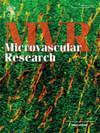Plasma neutrophil gelatinase-associated lipocalin level as a predictor of atherosclerotic cardiovascular disease risk in patients undergoing catheterization
IF 2.7
4区 医学
Q2 PERIPHERAL VASCULAR DISEASE
引用次数: 0
Abstract
Background
Atherosclerotic cardiovascular diseases (ASCVDs) represent a global health burden contributing to substantial morbidity and mortality. The neutrophil gelatinase-associated lipocalin (NGAL), a small glycoprotein, is secreted by inflammatory neutrophils, macrophages, and dendritic cells, playing a role in inflammation. However, its relevance as a predictor of ASCVDs risk across patients from low to very high-risk, and correlation with the need for revascularization by percutaneous coronary intervention (PCI) or coronary artery bypass surgery (CABG) remains largely unexplored. Our objective was to assess plasma NGAl levels in patients with low to very high risk of ASCVD and their relationship with the severity of CAD and the requirement for revascularization.
Methods
Outpatients and patients undergoing catheterization were categorized into low, moderate, high, and very high risk of ASCVD. Plasma levels of NGAL were measured using ELISA and analyzed in relation to CAD status and the need for revascularization by PCI or CABG.
Results
Plasma NGAl levels were elevated in CAD patients, with higher levels in patients with acute coronary syndrome compared to those with stable angina. A gradual increase in plasma NGAl levels was noted with the elevated risk of ASCVD and degree of coronary artery stenosis. Notably, plasma NGAl level was independently correlated with ASCVD risk and the need for revascularization by PCI.
Conclusion
Our study indicates that plasma NGAl levels are linked to the risk of ASCVD and may help predict the development and severity of CAD. Further research targeting NGAL could explore its potential to mitigate the risk of ASCVD.
血浆中性粒细胞明胶酶相关脂钙蛋白水平作为导管置入术患者动脉粥样硬化性心血管疾病风险的预测因子
背景:动脉粥样硬化性心血管疾病(ascvd)是导致大量发病率和死亡率的全球性健康负担。中性粒细胞明胶酶相关脂钙蛋白(NGAL)是一种小糖蛋白,由炎症中性粒细胞、巨噬细胞和树突状细胞分泌,在炎症中起作用。然而,其作为低至高危患者ascvd风险预测指标的相关性,以及与经皮冠状动脉介入治疗(PCI)或冠状动脉搭桥手术(CABG)的血运重建术需求的相关性在很大程度上仍未被探索。我们的目的是评估低至极高ASCVD风险患者血浆NGAl水平及其与CAD严重程度和血运重建需求的关系。方法:将门诊患者和导管置入术患者分为ASCVD低、中、高、高危组。采用ELISA法测定血浆NGAL水平,并分析其与冠心病状态和PCI或CABG血运重建需求的关系。结果:冠心病患者血浆NGAl水平升高,急性冠状动脉综合征患者血浆NGAl水平高于稳定型心绞痛患者。血浆NGAl水平随着ASCVD风险和冠状动脉狭窄程度的升高而逐渐升高。值得注意的是,血浆NGAl水平与ASCVD风险和PCI血运重建需求独立相关。结论:我们的研究表明血浆NGAl水平与ASCVD的风险有关,并可能有助于预测CAD的发展和严重程度。针对NGAL的进一步研究可以探索其降低ASCVD风险的潜力。
本文章由计算机程序翻译,如有差异,请以英文原文为准。
求助全文
约1分钟内获得全文
求助全文
来源期刊

Microvascular research
医学-外周血管病
CiteScore
6.00
自引率
3.20%
发文量
158
审稿时长
43 days
期刊介绍:
Microvascular Research is dedicated to the dissemination of fundamental information related to the microvascular field. Full-length articles presenting the results of original research and brief communications are featured.
Research Areas include:
• Angiogenesis
• Biochemistry
• Bioengineering
• Biomathematics
• Biophysics
• Cancer
• Circulatory homeostasis
• Comparative physiology
• Drug delivery
• Neuropharmacology
• Microvascular pathology
• Rheology
• Tissue Engineering.
 求助内容:
求助内容: 应助结果提醒方式:
应助结果提醒方式:


